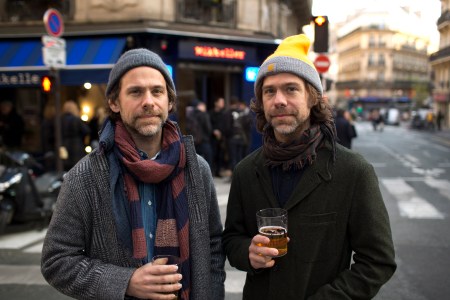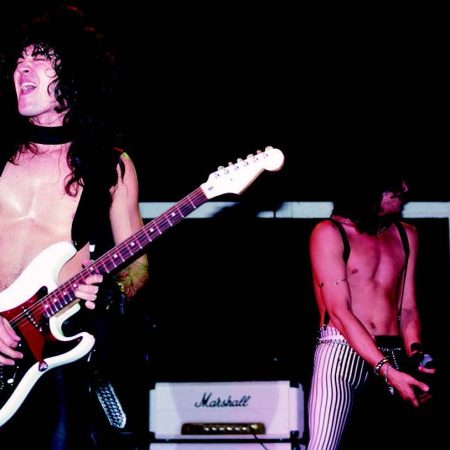Many of the hyped early-to-mid-2000s indie rock bands had a shtick. For Interpol, it was the black and white suits. For Franz Ferdinand, it was leg kicks and a playful take on Russian propaganda imagery. For the Yeah Yeah Yeahs, it was Karen O spitting beer and wearing wild costumes. The list goes on.
So when the Arctic Monkeys burst onto the scene with their debut album in 2006, they seemed conspicuously normal. With his hoodies and occasional cargo pants and upturned polo collars, lead singer Alex Turner looked like he could have been plucked straight out of a middle school classroom (he was just barely 20 at the time of the record’s release in January 2006). His bandmates didn’t look much different either; the story goes that these were just a few middle-class lads from Sheffield, England, who picked up instruments one day out of boredom and a couple years later just happened to release an album that brought them unexpected fame and worldwide acclaim.
But their juvenility and catchy dance-punk music couldn’t obscure the fact that Turner’s lyrics contained a level of observation that made him sound well beyond his years. The album, titled (quite appropriately for this essay) Whatever People Say I Am, That’s What I’m Not, painted a gritty, visceral picture of his working-class hometown through a mix of memorable characters and places. There were drunk teenagers toying with police officers (“Riot Van”), romance-less pool halls (“A Certain Romance”), prostitutes dealing with “scummy” men (“When the Sun Goes Down”) and plenty of dance club flirtation (“I Bet You Look Good On the Dancefloor”).
A prominent theme throughout — which also permeates the band’s second album and even a bit of the third — was nuanced class commentary, delivered with a biting sense of humor. Faux bohemians, social climbers and anyone else who seemed phony, self-righteous or overly obsessed with money were frequently the focus of Turner’s boiling ire. A British term that really helps encapsulate the type is “wanker” — which on the surface means someone who is “wanking,” or masturbating, but in common slang is used in a much broader way, aimed at people who are broadly contemptible or narcissistic. People who might even masturbate to themselves.
The track “Fake Tales of San Francisco,” for instance, is set at a party where a “fucking wank” band is playing. Turner notes subtle markers of class distinctions — or at least the ones the phonies want him to see — such as the band’s trilby hats and glasses of white wine. The “weekend rockstars are in the toilets/Practicing their lines,” and other guests try to sound worldly by talking about their travels to American cities like San Francisco, while they’re actually from Turner’s territory, which as a whole is one of the more impoverished regions of the United Kingdom: “You’re not from New York City, you’re from Rotherham/So get off the bandwagon, and put down the handbook.”
On the track “Perhaps Vampires Is a Bit Strong But…” he gets even more direct: “I ain’t got no dollar signs in my eyes/That might be a surprise but it’s true, said, I’m not like you…Cause all you people are vampires/And all your stories are stale/And though you pretend to stand by us/I know you’re certain we’ll fail.”
From Portland to Paris, Indie Rockers Are Taking Over the Restaurant Biz
Support your local artists (by eating at their restaurants)By the next year, on the band’s equally loud and bracing follow-up album Favourite Worst Nightmare, Turner’s sudden fame has given him a view into the world of real celebrity, which he seems to disdain just as much as the parties he used to find himself at. On “Teddy Picker,” he lambasts those who pine after fame the way an arcade game claw (teddy picker) reaches for a teddy bear. And on “If You Were There, Beware,” he calls paparazzi “serpent soul pinchers” who “Take the swords to the innocents” to “fill column inches.”
Fast forward to late August — past several albums that explore different genres, and well over a decade of indie rock domination — and this is all a distant memory. The band released “There’d Better Be A Mirrorball,” the first single for their seventh album, The Car (out Oct. 21), which is musically a seamless continuation from their previous record Tranquility Base Hotel and Casino (don’t take my word for it; drummer Matt Helders said so well before the song was released).
One could argue that on the theoretical rock spectrum, the current Arctic Monkeys are now literal sonic opposites of their former selves. Their sound, as it is on “Mirrorball,” is now often anchored by Turner on piano, not a guitar, in more leisurely time signatures. The track features strings, maybe even a touch of harpsichord. And to fit the silky smooth vibe, Turner croons in a baritone vibrato; on the follow-up single “Body Paint,” released last month, he unleashes a torrent of falsetto. It’s not quite the walloping drums of “Brianstorm” or the thick distortion of “R U Mine.”
The music video for “Mirrorball” is also the clearest visual summary of the new Turner that the band has released so far. His look and affect fit the new vibe and the music: no longer an angry teen in a hoodie, he resembles Tom Jones circa 1975, shown at various moments buttoning a striped dress shirt that fits under a fancy white jacket, and gesturing with his hands while recording vocals in a dressy sweater and sunglasses. He even sways, tussles his hair and almost dances a bit while trying to nail vocal takes — looking like a golden age movie producer who took a Quaalude before heading to a party in the Hollywood Hills. To hit the point home about the retro feel, the visuals are all grainy, as if they were shot in 16 mm film.
It all could be called the unsurprising climax of an evolution that began around 2012, when Turner moved to Los Angeles and first began gelling his hair like an ’80s greaser. But the roots of this Turner 2.0 were there almost from the start of the Arctic Monkeys. After collaborating on a few tracks with fellow well-known indie rocker Miles Kane (including “505,” the first Monkeys song built around an organ line, found on Favourite Worst Nightmare) the pair formed the heavily ’60s- and ’70s-influenced supergroup The Last Shadow Puppets and released an album in 2008. It featured a heavy dose of spy thriller-style strings, acoustic guitar, even tambourine, and the duo pointed to inspirations like Serge Gainsbourg and Scott Walker (whose own hand gesturing Turner seems to have studied).
The Arctic Monkeys would go on to try out a few variations of the indie genre — desert rock sludge on the Josh Homme-produced Humbug album (2009), jangly guitar pop on Suck It and See (2011) — before their most recent and most dramatic pivot, 2018’s Tranquility Base Hotel and Casino, which saw them jump headfirst into jazzy, psychedelic (even “lounge lizard”) arrangements.
Still, through all the change, Turner laced a healthy amount of social commentary into Tranquility Base. The album’s title alone can be read as an allegory for the seductions of capitalism and the numbing effects of excess, something he undoubtedly encounters and thinks about as a rock star in his new home city.
In “Four Out of Five,” he pokes fun at the ever-onward march of human colonialism. The song’s narrator talks about a newly opened taqueria on the moon — a planet that’s “getting gentrified” — and the perhaps not-so-far-fetched future of space tourism: “Come and stay with us, it’s such an easy flight/Cute new places keep on popping up/Around Clavius [a crater on the moon].”
The title track opens with the line “Jesus at the day spa/Filling out the information form” — even a messiah can’t resist modern comforts or avoid their commodification. In the song’s music video, Turner wanders alone through a sprawling, futuristic hotel and casino, surrounded by eerie neon lights.
He’s also incredibly self-aware of his aesthetic 180 and his own celebrity at various points of the album, to the point of comedy. On the first lines of the first song, “Star Treatment,” he quips, “I just wanted to be one of The Strokes/ Now look at the mess you made me make.” Later in the song, he calls himself a lounge singer from the ’70s, an era he didn’t live through, building the case that he has consciously constructed a character: “Oh, maybe I was a little too wild in the ’70s/Back down to earth with a lounge singer shimmer.”
But “Mirrorball” — an old-school word for disco ball that seems like something only the new Alex Turner would use in 2022 — is a far more straightforward love song about the end of a relationship. “So if you wanna walk me to the car/You oughta know I’ll have a heavy heart” goes the chorus. He’s finally comfortable living in the new musical world he has built. When he goes into a falsetto towards the end of the song, it’s genuine and beautiful — he’s not making fun of the concept of a crooner breaking out a falsetto.
There is nothing at all objectively “bad” or worth policing in his new music, or his new persona. It’s just hard not to see 2022 Alex Turner as a package that 2006 Alex Turner — at least the one we knew from his lyrics — would have laughed at: a 36-year-old gussied up in suits and fancy jewelry, swaying and gesturing in the microphone booth, recording ’70s-style ballads? Could that even be what a British teenager would call a wanker?
And while hardcore fans could argue that the Monkeys’ latest turn isn’t worth lingering on too much either, especially after the bombshell that was Tranquility Base, the new songs are a notable development in at least one undeniable sense: the rock world may have lost one of its most incisive social critics.
Of course, any ideas here have to be taken with a grain of salt, since the title of Turner’s first Arctic Monkeys album seems to have anticipated all of this theorizing right from the start.
This article was featured in the InsideHook newsletter. Sign up now.






















